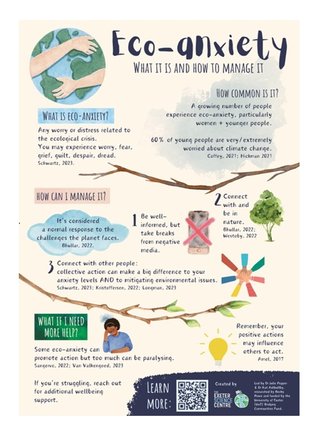A unique one-day summit for school leaders and their student leaders to work together on strategies for change
Eco or climate anxiety has been defined as 'any worry or distress related to the ecological crisis, including experiencing worry, fear, grief, despair, avoidance, shame, hopelessness, hope and dread' (Hickman et al., 2021; Olsen et al., 2023).
Many experts see eco-anxiety as a completely rational response to the issues our planet faces. There is a growing body of work in this space, especially with children and young people. For example, Hickman et al (2021) surveyed ten thousand 16–25-year-olds across the world, and found they were worried about climate change. More than 50% reported feeling sad, anxious, angry, powerless, helpless, and guilty about climate change. More than 45% of respondents said their feelings about climate change negatively affected their daily life and functioning, and many reported a high number of negative thoughts about climate change.

Although eco- anxiety can affect people differently, there are ways to tackle it. Research suggests that collective action combined with other strategies (such as sharing feelings with like-minded others) can be a powerful solution in both addressing feelings of eco-anxiety and working on environmental issues. This also fits with recent work on eco-generativity, which involves caring for future environments and generations as well as supporting an environmental identity and hope, as a healthy response to eco anxiety (Di Fabio & Svicher, 2024).
This blog piece includes insights from a University of Exeter Education incubator project entitled “From eco-anxiety to action: An innovative video resource for students and staff co-designed with Exeter Science Centre and Natural England.”
The project, which fits with Exeter’s 2030 strategy, where “greener” is one of the key priorities, stemmed from Kat teaching environmental psychology and meeting students with eco anxiety while Julie was embedding the Sustainable Development Goals (SDGs) into her Business School teaching. We wanted to be able to offer a resource that could be used by students across the university to better understand eco-anxiety and what they can do to manage it. While the 17 SDGs are ultimately aimed at countries, it is thought students can play a part in achieving them, as individuals and in partnership with others, by becoming more aware of the issues and acting for change, and there is a growing body of work in this space.
Edge Foundation Kat Emms 2021 blog piece suggests education establishments need to be supported to develop their curriculum and pedagogies which include learning in and about the environment. Key to this project, like other green initiatives at Exeter, was co-creation with students. We were fortunate to work with Becky Rowe as a student intern, who herself leads the “Be the Change” society, a student led society promoting environmentalism and sustainability. Working with Becky, Exeter Science Centre and Natural England, we created a research informed infographic explaining eco anxiety.

We then went on to create a series of “shorts” (short videos), first, what eco anxiety is, second, tackling eco anxiety through reconnecting with nature, third tackling eco anxiety through collective action and fourth tackling eco anxiety through changing our behaviours. These videos are research informed and created with and by students.
We carried out a small questionnaire study to gauge eco-anxiety and gain insights into the resources themselves. We had 38 participants, aged between 18 and 56, with 90% being 23 or under, 40% male and 53% female. Our small sample comprised first years to postgraduates, who mainly described their ethnicity as white. In line with previous work, students were worried about the climate, with 40% saying, “My concerns about climate change make it hard for me to have fun with my family or friends” (sometimes, often or always). Notably, 71% said “I feel anxious about my personal responsibility to help address environmental problems” (sometimes, often, almost always), 63% said “I use nature to help with feelings of anxiety around the climate” (sometimes, often, almost always) and 66% said “I feel I have the opportunity during my degree to engage with issues around climate change and the climate crisis” (sometimes, often or almost always).
Overall, the comments about the resources were positive, but for some, especially those already in engaged in this climate action, they didn’t go far enough. Our next steps are to focus on the messaging around the resources as well as develop some more detailed resources. Please do get in touch if you would like to connect with this work (j.s.a.pepper@exeter.ac.uk or k.ashbullby@exeter.ac.uk).
